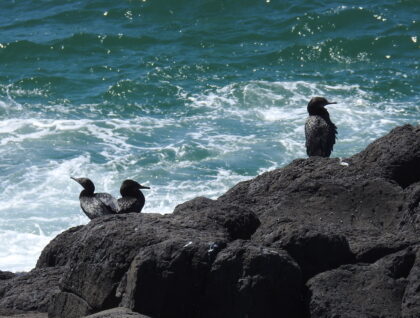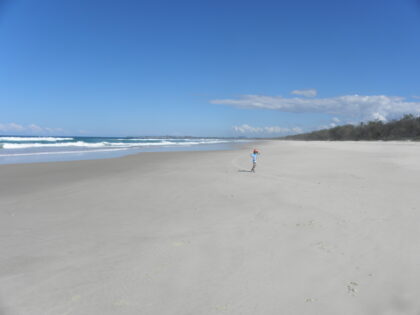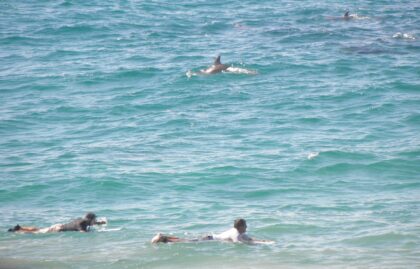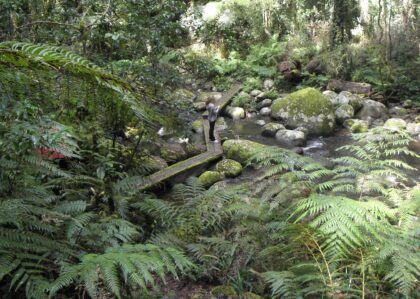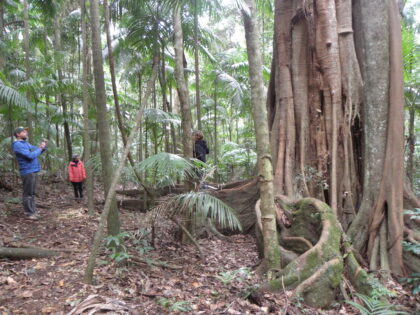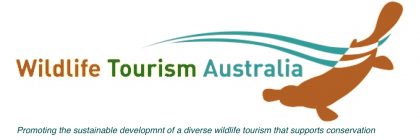
Wild Tails: the Value of Story-telling
and other Quality Interpretation in Wildlife Tourism
Registration. ——– Program. ———- Venue and accommodation.
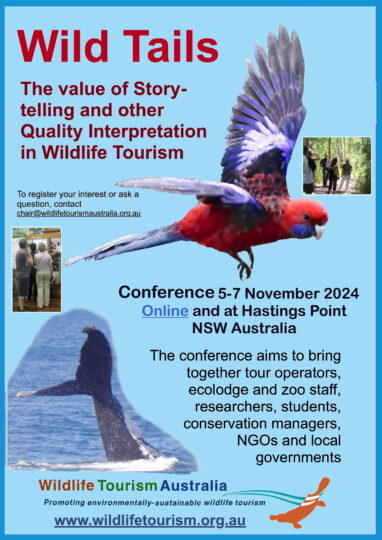
Tuesday to Thursday 5-7 November 2024
A conference for tour guides, ecolodges, conservation managers, researchers students, wildlife parks, destination managers, NGOs and general educators
Where?

Online and at North Star Holiday Resort, Hastings Point, northeastern New South Wales, Australia
10% discount on accommodation for first 50 delegates.
More details at https://www.wildlifetourism.org.au/wild-tails-venue-conference-2024-accommodation-and-getting-there/
Registration and call for papers
Registration details: https://www.wildlifetourism.org.au/registration-wildlife-tourism-australia-conference-2024/.
Call for papers: https://www.wildlifetourism.org.au/call-for-papers-wildlife-tourism-conference-2024/
Abstracts for oral presentations have now closed but you can still submit an abstract for a poster (anything up to A0 size)
A report (with content permission from each presenter) will be published on this website as for our 2022 event
Contact the chair for any queries
Program
See our provisional program (remember details may change)
What is Interpretation?
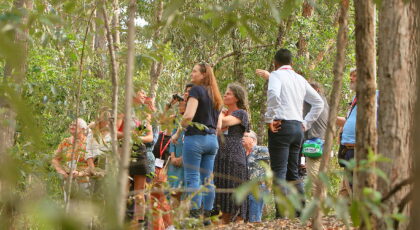
From Merriam-Webster Thesaurus: “to make plain or understandable.”
They elaborate that “Some common synonyms of interpret are elucidate, explain, explicate, and expound. While all these words mean “to make something clear or understandable,” interpret adds to explain the need for imagination or sympathy or special knowledge in dealing with something.
Wildlife and nature Interpretation


A traveller arrives at a new destination. Before him is a stretch of woodland with many inhabitants: small furry creatures with a bizarre love-life, feathered ones with amazing architecture skills, tiny but beautiful insects and plants with intriguing ways for attracting pollinators . The geological history that made it all possible is quite a story in itself. But the traveller sees only a stretch of smallish trees with some hills in the background, takes a few photos, and leaves without ever knowing what was there.
I used to visit Glacier Rock TeaHouse south of Adelaide. An ancient glacier (yes, Australia did once have glaciers) had lifted a huge granite boulder while passing through Visitor Harbour and dumped ere in soft sediments. Visitors can now see it easily in the creek bank, all these 500 million years later, as well as scratch marks on nearby rocks from the glacier slowly moving over tham. But most visitors called in, had a cup of tea/coffee and snack and left again without any idea of what was sitting there beneath them. That always seemed a shame.

I’ve been on wildlife tours in various countries where animals have been pointed out and named, everyone gets a photo and we move on without any new insights into the behaviour or ecology or conservation needs of the animals we’ve just seen. I’ve been on other tours with excellent guides, where I came to know and understand a lot more about all the species we encountered and how they fit into the ecosystem.
Tourists vary hugely in their desire to learn. Some ask questions about almost everything, while others just want a few photos to show friends. But there are ways of making things interesting even for those who don’t initially feel the need to learn, while also delighting the enthusiasts.
Why should we want tourists to learn about wildlife?
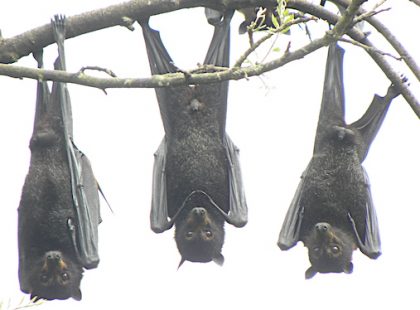
- We (as guides or ecolodge managers or zoo-keepers) are entranced by wildlife and enjoy sharing our enthusiasm
- If people understand more about the animals they may better understand why they should avoid disturbing them, and also support conservation efforts of others
- It can dispel some exaggerated fears about certain animals and also explain some genuine risks
- It can help increase satisfaction even if the animal can’t be found on a particular day to be shown tracks, scats, burrows, the kinds of plants they use for food or shelter etc.
- If we can “hook” visitors with interesting stories and information about the animals it can enhance their satisfaction with the tourism experience and encourage them to return or recommend to friends
- It may open up whole new worlds for the traveller, starting to see how fascinating nature can be, maybe developing a new hobby while traveling or after returning home
- It can add to the knowledge of those who are already amateur naturalists, ecology students, biology lecturers, nature journalists and others – and suggest to them further possibilities for research, writing and other wildlife-based activities.
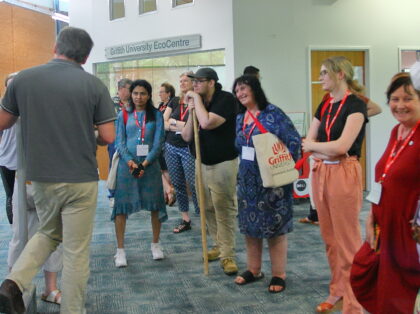
Topics for this conference:
- How do we best design interpretive experiences for a variety of visitors – different age groups, levels of interest or prior knowledge, different levels of understanding of the language spoken by the guide, different cultural backgrounds etc.?
- How can we awaken interest in the “forgotten fauna”: reptiles, insects, rat-like mammals, small brown birds etc. with interesting behaviours or important ecological roles?
- What are the best ways to use story-telling to capture interest and also impart some important or fascinating information?
- How can we best guide our visitors’ behaviour for minimal-impact viewing?
- Different methods of interpretation: face-to-face guiding, self guided nature trails, interpretive signage in zoos or wilderness areas, apps, websites, virtual reality etc
- What to avoid when giving out information (e.g. don’t make things easy for poachers) or opinions (e.g. clarify the difference between fact and opinion, examine your own possible biases).
- Anything else of relevance to interpreting wildlife and their habits to visitors.
“An average human looks without seeing, listens without hearing, touches without feeling, eats without tasting, moves without physical awareness, inhales without awareness of odour or fragrance, and talks without thinking.” Leonardo da Vinci. (Can guides help to change this just a little?).
Keynote speakers
Jennifer Waithman, Interpretation Australia
Jonathon Spring (online)
Bill Reynolds and Mike Mayer, Experiential Interpretive Design (online)
Anton Lategan Ecotraining, South Africa (online)
Click here for our keynotes page
The Venue: conference and accommodation
See also https://www.wildlifetourism.org.au/wild-tails-venue-conference-2024-accommodation-and-getting-there/
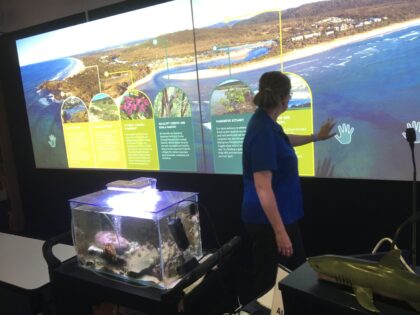
Online delegates are very welcome but will miss out on our lovely venue, North Star Holiday Resort, Hastings Point, just across the road from a walk through the trees to a long stretch of white sandy beach fringed with native woodland.
Accommodation ranges from camping to self-contained villas wth spa baths.
Like to find another delegate to share a 2 o r3 bedroom cabin with? Let us know and we’ll try to help.
The resort is offering discounts for delegates
Choose from:
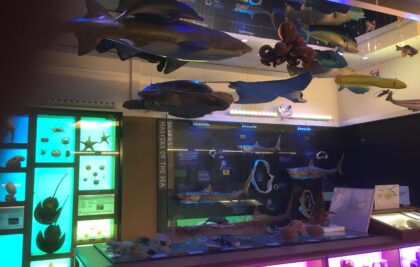
To book your accommodation please visit https://www.wildlifetourism.org.au/wild-tails-venue-conference-2024-accommodation-and-getting-there/

Incorporated into the resort is a very impressive facility: the Marine Discovery Centre, a great example of nature interpretation for tourists, school groups and others, with many different styles of passive viewing or interactive displays. It was started by environmentalist Ted Brambleby and teacher Kerrie Trees many years ago (read their story here) and more recently expanded with a substantial grant.
Our field trips will also offer local birdwatching in forest and wetlands, koala habitat, subtropical rainforests and other delights, with of course expert interpretation.
Registration and call for papers
Registration details https://www.wildlifetourism.org.au/registration-wildlife-tourism-australia-conference-2024/.
Call for papers : https://www.wildlifetourism.org.au/call-for-papers-wildlife-tourism-conference-2024/
If you have any questions, please contact chair@wildlifetourismaustralia.org.au
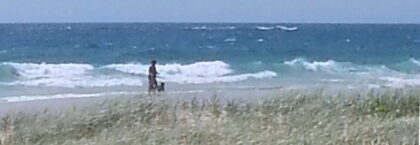
Sponsorship
All sponsors, whether offering $50 or $5000 will be acknowledged, with links to their websites, on this page, an PR material and during the conference.
Donations of $100 or more will entitle the sponsor to a 10-minute lunchtime or dinner presentation
Donations of $600 or more will entitle one member of your organisation to attend each day of the conference (not necessarily the same person each day).
If you would like to donate for a specific purpose (conference dinner, airfares for keynote speaker or a delegate from a developing country), your company’s name will be associated with this each time it is mentioned.
A few photos of northern New South Wales
(courtesy of Araucaria Ecotours).
Stay tuned for details of pre- and post- conference tours.
